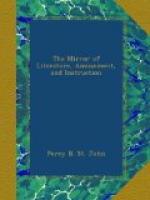at an early age; and since war no longer exists to
supply their place with the irresistible military,
the importance of a single man, however small his
attractions, however advanced his age, is considerable;
while a tolerably agreeable bachelor under sixty is
the object of universal attention, the cynosure of
every lady’s eye. In the cathedral city,
where I visited a friend some years since, there were
forty-five single women, from sixteen to fifty, and
only three marriageable men. Let any one imagine
the delight of receiving the most flattering attentions
from fifteen women at once, some of them extremely
pretty and agreeable; or, I should rather say, from
forty-five, since the three bachelors, politically
avoiding all appearance of preference, were courted
equally by nearly the whole phalanx of the sisterhood.
One of the enviable men, being only just of age, was
indeed too young to excite hopes in the more elderly
ladies, but another more fortunate, if he knew his
happiness, ("sua si bona norit"), was exposed
to the attacks, more or less open, of every unmarried
woman. Alas! he was insensible to his privileges;
a steady man of fifty-five, a dignitary of the church,
devoted to study, and shy in his habits, he seemed
to shrink from the kind attentions he received, and
to wish for a less favoured, a less glorious state
of existence. His desires seemed limited to reading
the Fathers, writing sermons, and doing his duty as
a divine; and he appeared of opinion that no helpmate
was required to fulfil them. But still the indefatigable
phalanx of forty-five, with three or four widows as
auxiliaries, continued their attacks, and his age,
as I before observed, was fatally encouraging to the
hopes of each. The youngest looked in their glasses
and remembered the power of youth and beauty; the
middle-aged calculated on the good sense and propriety
of character of their object, and were “sure
he would never marry a girl;” and the most elderly
exaggerated his gravity, thought of his shovel hat,
and seemed to suppose that every woman under fifty
must be too giddy for its wearer. Meanwhile,
what a life he led!—his opinions law; his
wishes gospel; the cathedral crowded when he preached;
churches attended; schools visited; waltzing calumniated;
novels concealed; shoulders covered; petticoats lengthened—all
to gain his approving eye. The fact is, his sphere
of useful influence was much enlarged by his single
state; as a married man, he could only have reformed
his wife; as a bachelor, he exercised undisputed power
over every spinster in his neighbourhood. He
was, indeed, unconscious of, or ungratified by the
deference and incense he received; but the generality
of men are less insensible, and half the homage he
so carefully rejected would have been sufficient to
intoxicate with delight and self-complacency the greater
part of his fraternity. What object in nature
is more pitiable than a London old bachelor, of moderate
fortune and moderate parts? whose conversational powers




